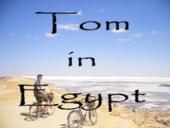Here's my latest piece for Meedan on HuffPo, I'm pasting it here in its entirety as I think it's a pretty important event - check out the photo linked below (not the one in the actual post) and on my Facebook.
It's good to finally see ElBaradei getting his hands dirty as it were and actually standing alongside Egyptians in protest: judging from the shrill tone of the Gomhoreyya piece below I think the turnout stung the government. How they can claim only 400 people turned out, even in light of photos showing many, many more EVERYWHERE online is an absolute mystery. One of the pieces I linked to is particularly interesting, from the state mouthpiece Al-Ahram. Here the writer seems to be criticizing the police for not coming up with a credible explanation for how Said died, but also notes how the family's narrative spread like wildfire over the internet and quickly became the accepted version of events. It seems the writer at Gomhoreyya wasn't paying attention and decided to opt, once again, for the incredible lies rather than the painful (for them) truth.
-
The death of a young businessman in Alexandria, Egypt, reportedly at the hands of two police officers, has led thousands to the streets in protest against police brutality, writes Tom Trewinnard.
Since news of Khaled Said's death broke several weeks ago, gruesome pictures of his mutilated skull have appeared on many blogs and Facebook pages juxtaposed with images of Said looking youthful and fresh-faced - stark visual evidence lending credence to Said's family's allegations that their son was beaten to death by two local police officers.
Mamoun al-Bassiouni, in an unusually critical article for pro-governmental daily Rose Al-Youssef, writes:
لا يوجد ما يقنع أو يبرّر ما تردد أن يقوم اثنان من المخبرين بدفع رأس متّهم في شريحة رخامية داخل المحل الذي ذهب اثنان من المخبرين، للقبض عليه فيه ! وهو ما أدي إلي إصابته وتلطيخ وجهه بالدماء، ثمّ يقومان بسحله إلي داخل مدخل إحدي العمارات المجاورة ويضربانه بقسوة ويخبطان رأسه في الباب الحديد حتّي كسرت أسنانه وصمت نهائيّا وفقد حقّه في قدرته علي الصراخ .
The official version of events as reported in the state media, however, insists that Said died as a result of "asphyxiation". An official autopsy earlier this week also found this to be the case, although the aforementioned image, along with eyewitness reports, seem to discredit this version of events. Writing in the largest of the state-run papers, Al-Ahram, Hazem Abdel Rahman comments on the speed with which the family's story was spread and accepted, and laments the official police response:
للأسف.. فإن البيانات الصادرة عن الشرطة حول الحادث, عجزت وفشلت في تقديم تفسير منطقي للحادث وما أسفر عنه من وفاة خالد.. فقد انصب اهتمام الشرطة علي تصوير خالد في صورة مسجل خطر أو بلطجي أو حشـاش أو هارب من التجنيد...الخ. وكل هذا لا يجيب عن سؤال: إذا افترضنا أن كل هذا صحيح.. فهل يجوز تصفيته؟!
With many critics deriding the official investigation carried out thus far as a whitewash, Mohammed Esmat in independent daily Al-Shorouk called for a more honest and open inquest into the death, and warned of the potential consequences if this does not happen:
الكرة الآن فى ملعب اللواء حبيب العادلى الذى ينبغى ان يفتح تحقيقا أمينا ونزيها فى واقعة وفاة خالد سعيد، وتوقيع عقوبات رادعة ضد المخبرين اللذين تسببا فى وفاته، إذا ثبت ذلك، من أجل فتح صفحة جديدة فى علاقة الشرطة بشباب هذا الوطن الذين سيواصلون بالقطع مسيرة المظاهرات ومسيرة البانجو.. طالما استمرت حكوماتنا فى سياساتها الراهنة، دون ان تعطيهم أملا فى تغيير واقعهم البائس!
As the protests got underway in Said's home city of Alexandria, attendees posted pictures, videos and text updates on Twitter - many choosing to focus on the significant, if brief, attendance of Mohammed ElBaradei, who has taken a leading role in campaigning for reform in Egypt since returning to the country earlier this year. Karima Kamal, writing in Al-Masry Al-Youm before the demonstration, noted the potential significance of the protests:
ربما تكون هذه هى المرة الأولى منذ سنوات عديدة التى يخرج فيها المصريون فى الخارج احتجاجا على ما يجرى فى الداخل بعيدا عن احتجاج الأقباط على ما يعانيه أهلهم فى الداخل مما يعتبرونه تمييزا ضدهم. هذه المرة يخرج المصريون جميعا بصفتهم مصريين ليعترضوا على ما يجرى فى بلدهم بعيدا عن الطائفية وتصنيفاتها
The strongly pro-governmental Al-Gomhoreyya went on the attack against ElBaradei, belittling the protests as part of a political exercise on his part and claiming the number of protesters was insignificant (in spite of photos published online which suggest otherwise):
أعطي السكندريون درسا قاسيا للبرادعي وأنصاره من جمعية التغيير بغيابهم عن المسرحية السياسية التي أعدها مع رفاقه بمسجد سيدي جابر حيث كان يروج أن الملايين سوف يكونون في انتظاره ولم يزد عدد من انتظره علي 400 شخص.
Opposition leaders, however, will be unlikely to see the demonstrations as the "hard lesson" Al-Gomhoreyya describes. They were quick to emphasize that the protest wasn't about politics, but about "expressing indignation at this kind of torture". Ayman Nour, another senior opposition figure and former presidential candidate, summarised the impact of people taking to the street in protest, speaking to Al-Masry Al-Youm:
إن هذه الوقفة جاءت فرصة تتوحد فيها القوى السياسية ضد حالة الطوارئ وتعبيراً عن الحالة السياسية فى مصر والتي أظهرت كتلتين، الأولى لنظام يحكم بشكل منعزل وقوى وطنية تتضامن مع المواطنين فى مواجهة الاستبداد
Thanks to Ghaydaa, Yaser, Aya and Shaimaa for translations. You can add your view in two languages on http://news.Meedan.net.
Labels: Alexandria, Egypt, ELBaradei, Khaled Said, protest




